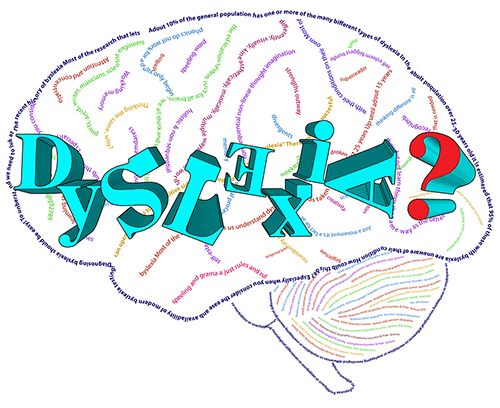
Dyslexia people experience difficulty learning to read fluently while maintaining full comprehension, despite having average or above average intelligence. Problems include difficulties with phonological awareness and phonological decoding, for example rhyming words and detecting syllables. Dyslexia can also affect processing speed, orthographic coding, auditory short-term memory, language skills/verbal comprehension and/or rapid naming. The above difficulties can affect how well a dyslexic person develops the ability to read and write as children and as adults. Unidentified dyslexia impacts academic achievement, employment, self-esteem, the ability to achieve full potential and well-being, that can lead to depression and anxiety.
Many adult dyslexics can develop adequate reading skills and comprehension, but read more slowly than their non-dyslexic peers and have poorly spelling. Many can also get by in mainstream education but may not achieve academic grades that relate to that truly match their intellectual capabilities.
Dyslexia can be hereditary with siblings, parents, aunts or uncles having a diagnosis or history of difficulties associated with it. In some cases dyslexia can also overlap with other neurological conditions including ADHD, dyspraxia, dyscalculia, Aspergers and mental health issues.
Language

- Learning the alphabet
- Rhyming words
- Repeating what has been said
- Staying focused
- Pronouncing words correctly
- Speaking smoothly/fluently
- Understanding directions
- Understanding grammar/vocabulary
- Grasping a wide vocabulary
- Knowing the difference between words that look and sound similar
- Getting to a point quickly
Reading

- Naming Letters
- Matching letters to sounds
- Learning to read at expected age
- Remembering sight words
- Enjoying reading
- Learning and remembering new words
- Understanding mathematical word problems
- Reading at expected grade level and accuracy
- Reading aloud proficiently
- Reading confidently
Emotional

- Poor self-confidence
- Low self-esteem
- Fitting in with peers confidently
- Maintaining a positive attitude
- Interpreting non-verbal actions (e.g. body language) of others
- Identifying social strengths and weaknesses
- Making and keeping friends
- Dealing with unexpected challenges
Other Signs

- Assuming a good sense of direction
- Learning new games easily
- Learning and remembers new skills easily
- Memorising information
- Organising information
- Being even keeled from day to day
- Understanding space and direction
Language

- Learning the alphabet
- Rhyming words
- Repeating what has been said
- Staying focused
- Pronouncing words correctly
- Speaking smoothly/fluently
- Understanding directions
- Understanding grammar/vocabulary
- Grasping a wide vocabulary
- Knowing the difference between words that look and sound similar
- Getting to a point quickly
Reading

- Naming Letters
- Matching letters to sounds
- Learning to read at expected age
- Remembering sight words
- Enjoying reading
- Learning and remembering new words
- Understanding mathematical word problems
- Reading at expected grade level and accuracy
- Reading aloud proficiently
- Reading confidently
Emotional

- Poor self-confidence
- Low self-esteem
- Fitting in with peers confidently
- Maintaining a positive attitude
- Interpreting non-verbal actions (e.g. body language) of others
- Identifying social strengths and weaknesses
- Making and keeping friends
- Dealing with unexpected challenges
Other Signs

- Assuming a good sense of direction
- Learning new games easily
- Learning and remembers new skills easily
- Memorising information
- Organising information
- Being even keeled from day to day
- Understanding space and direction
To find out if there is a possibility of dyslexia, you can use the online questionnaire by following the link below. If after doing this, you feel that you would benefit from a dyslexia assessment, please contact us and we can put you in touch with a qualified diagnostic specialist. By entering your name and email the results of the questionnaire will be emailed to you upon completion.
It is also essential to remember that the results of the checklists on the NeuroKnowHow site are NOT a diagnosis. Our checklist is based on one developed in conjunction with Professor Tim Miles OBE of Bangor University following empirical research by NeuroKnowHow Associate Dr Ross Cooper, previously of LLU+, London South Bank University.
The checklist below does not attempt to record the talents, skills or potential linked with dyslexia; however, it screens for key difficulties experienced by people with dyslexia in terms of reading, spelling, memory, organisation and sequencing.
